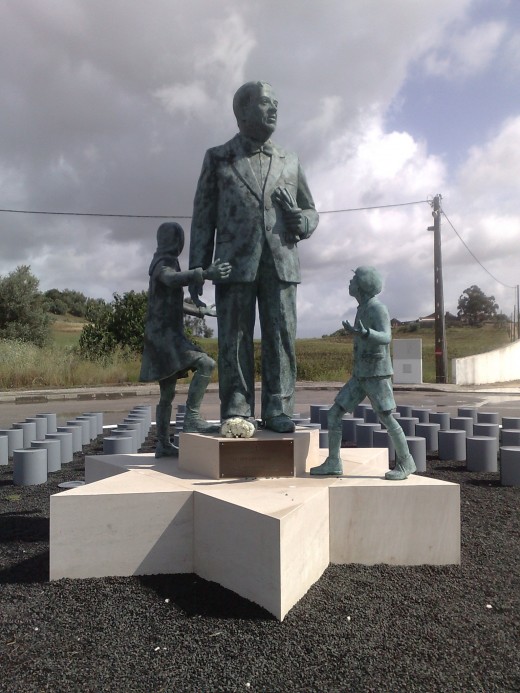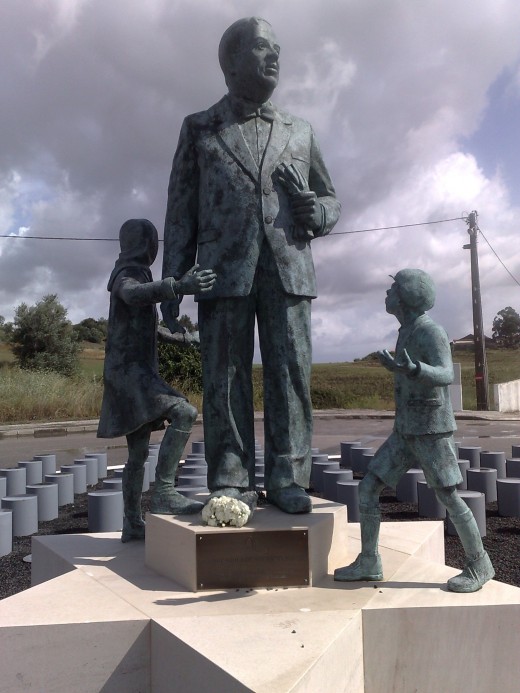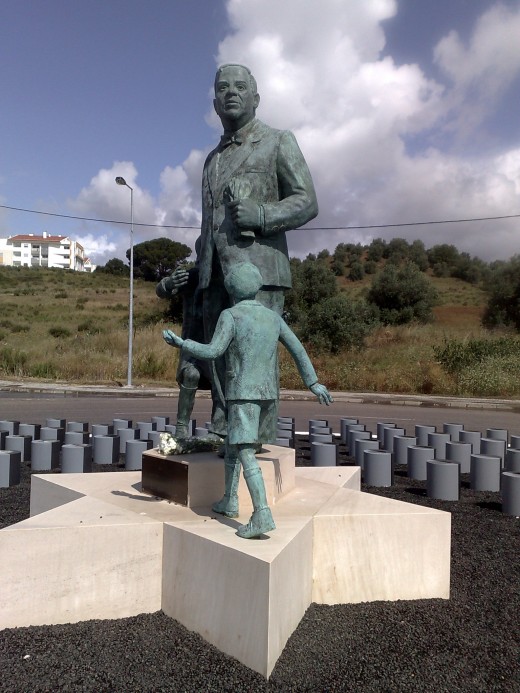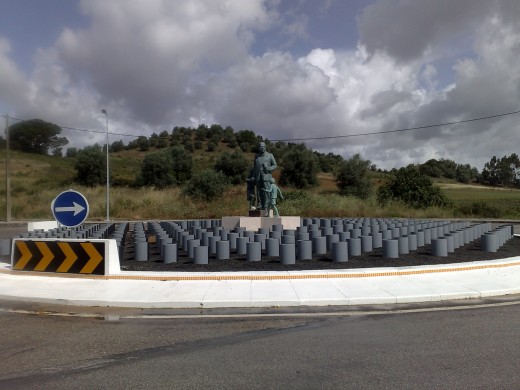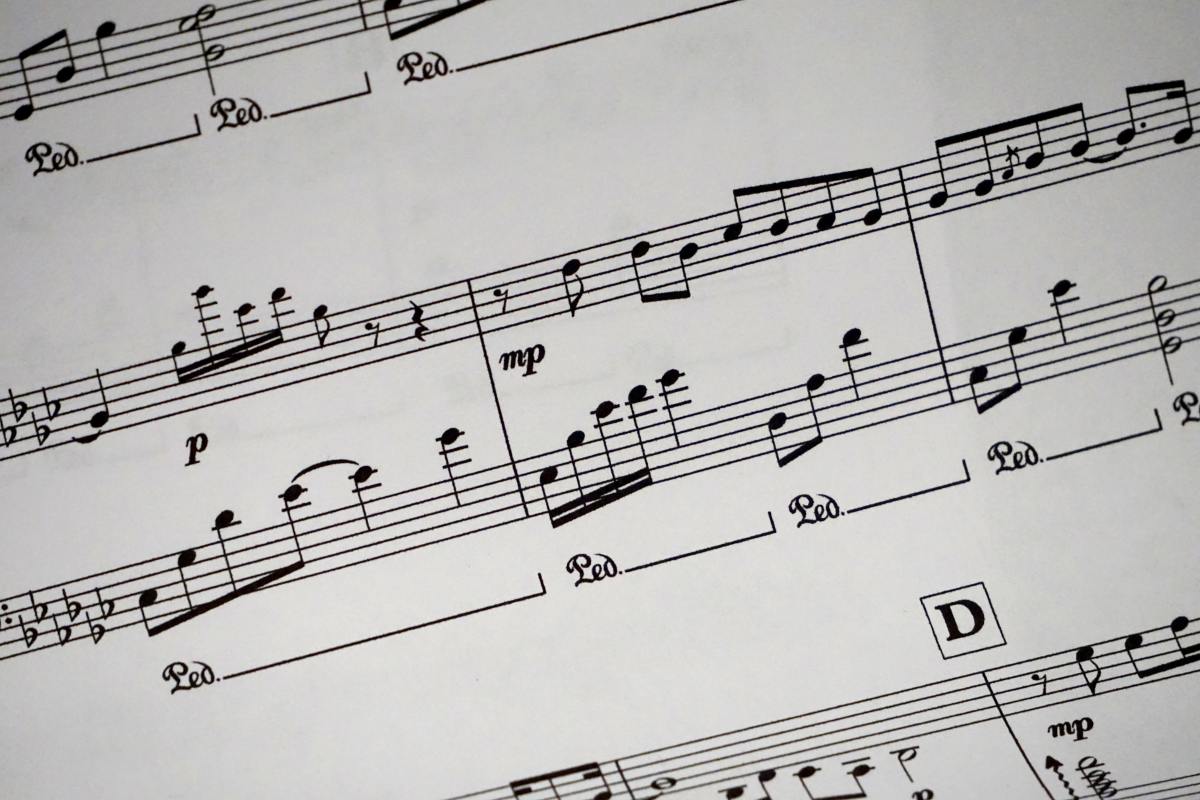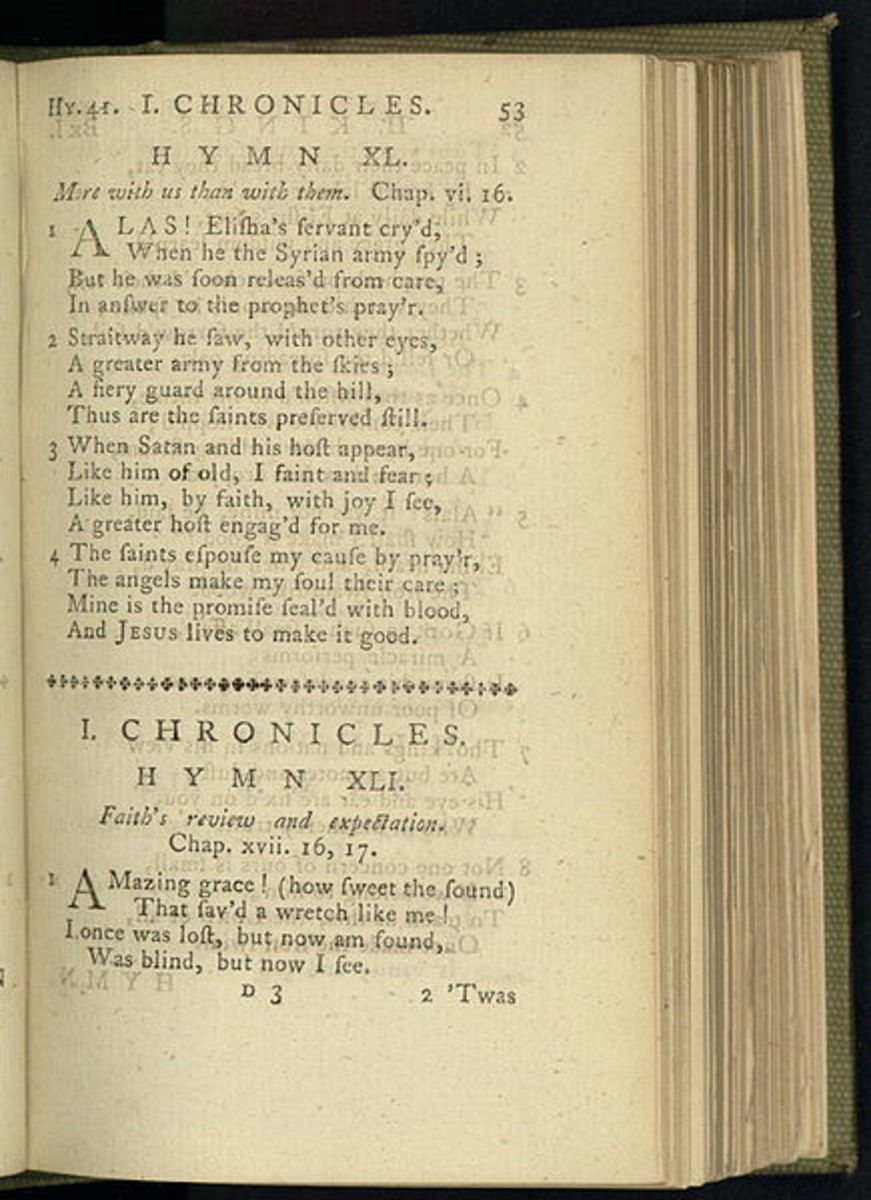Aristides de Sousa Mendes
“If thousands of Jews are suffering because of one Christian [Hitler], surely one Christian may suffer for so many Jews” - Aristides de Sousa Mendes
Aristides de Sousa Mendes was a religious man; posthumously proclaimed Righteous Among The Nations, hailed a hero and gave his all to his fellow man. Without doubt, he stands shoulder to shoulder with the likes of Oskar Schindler and yet he’s all but unheard of. His acts of humanity during the savagery of World War Two are awe-inspiring.
This is his story.
Aristides de Sousa Mendes
Aristides De Sousa Mendes
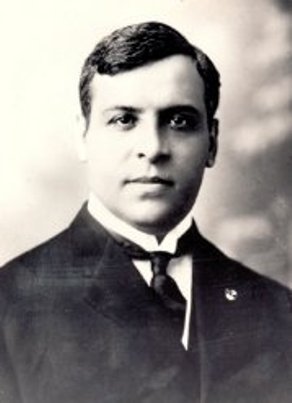
Sousa and Angelina
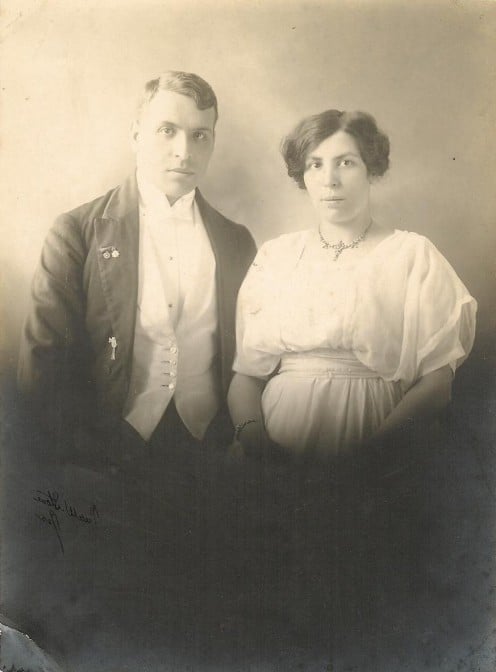
Aristides de Sousa Mendes was born in the parish of Viseu in Portugal, July 9th 1885. His was a family that was refined, sophisticated and united. His father, José de Sousa Mendes, was a judge of the Supreme Court.
His mother, Maria Angelina Ribeiro de Abranches de Abreu Castelo-Branco, was the granddaughter of a Viscount. He had one sibling, a twin brother, Cesár.
Mendes childhood and formative years are thought to have been happy and content. The Mendes household was based upon Catholicism and strong family values.
This was most likely the bedrock that provided Mendes with the strength to follow his conscience and heart later in life. Along the journey from child to adult, Mendes and Cesár developed an interest in law.
By 1908, Mendes and Cesár had graduated from the esteemed University of Coimbra, majoring in Law. That same year, Mendes married his beloved Angelina, born and christened as Maria Angelina Ribeiro de Abranches, the woman he preferred to call Gigi.
Their love was profound and long-lasting and between them, they raised fourteen children. Angelina was, in her own right, a woman of incredible depth and bravery.
She never wavered in her support of her husband, despite the difficulties and hardships she must have known would eventually descend upon their family.
Aristides de Sousa Mendes - Diplomatic Career
The Mendes Family
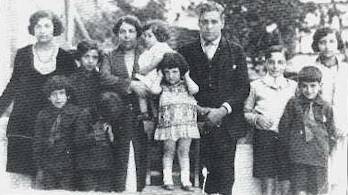
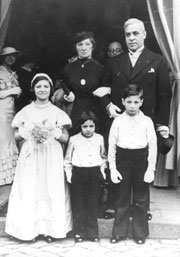
Aristides de Sousa Mendes career of choice was the diplomatic corp. Initially, Mendes and his growing family travelled the world, due to his various postings. He spent time in countries ranging from Kenya to the United States. By 1931, Mendes was in Antwerp, Belgium. They lived the life of a typical diplomatic family, though it wasn’t always an easy one. With an expanding family, Mendes and Angelina had to locate schools, adequate housing and adjust to new cultures and societies. Their children had to make new friends, settle into new schools and cope with at times what must have been a very nomadic lifestyle.
Sousa Mendes was in Antwerp almost ten years. He was a dedicated individual, applying his professional proficiency to his job whilst continuing to support and nurture his growing family. Shortly before World War Two began, Mendes was allocated to the Bordeaux consulate, in France. He was there when Germany invaded France in 1939. Mendes wasn’t a foolish man and had taken certain steps to protect his family. He was aware of the shadow on the horizon, he knew that Bordeaux had become unsafe and Mendes, pre-empting the breakout of war, had sent all but his two eldest children back to Portugal. His wife, Angelina and his two eldest sons, Pedro and José remained at his side.
Portugal’s then Prime Minister – Salazar – had declared Portugal as neutral, effectively removing the country from becoming directly involved in the war, for one side or the other. However, it was widely believed that Salazar favoured Hitler’s’ stance on the way he presided over Germany. Instructions were announced on the 11th of November 1939, ordering his ambassadors to deny visa’s to foreign nationals. Or, in his words "foreigners of indefinite or contested nationality; the stateless; or Jews expelled from their countries of origin". Around six months after the above edict was announced, Salazar followed it with: "under no circumstances" were visas to be issued without prior case-by-case approval from Lisbon. Basically, Salazar had effectively, as well as publicly, denied any of his consul the ability to aid those fleeing from Hitlers wrath.
Aristides Mendes And God
Friends In Fear And Adversity
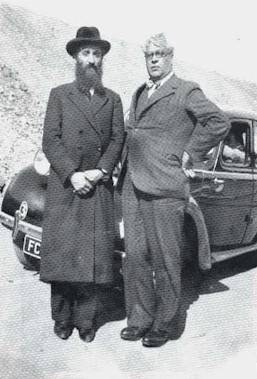
Honouring Aristides
- Aristides - On Stage
A theatre production, that opened in London in February of this year. It was produced by Alice de Sousa (no relation) in honour of Mendes, and also in the hope that the world would come to know who he was - and the incredible story behind the man.
Refugees Turned To Mendes For Salvation
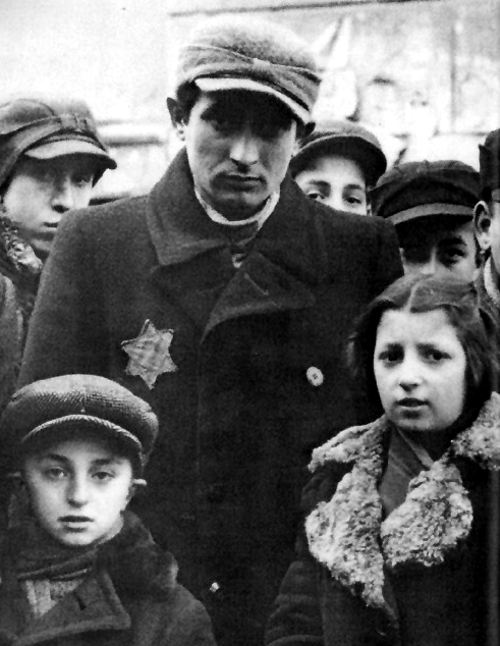
During his time in Bordeaux, Aristides de Sousa Mendes had struck up a friendship with a Jewish refugee, Rabbi Haim Kruger, and his family. As a result of his friendship with Rabbi Kruger, Mendes had learned only too well of the horrors the fell upon those that failed to meet Hitler’s’ ideal. Ultimately, he played an important part in Mendes final decision to defy his government, and stand one man against both Hitle - and Salazar.
“I would rather be with God against man - than 10,000 men against God”
Between the end of 1939 and the summer of the following year, Mendes had already begun issuing visas to those he considered in need. At one point, Mendes was castigated for granting a visa to Professor Arnold Wizrntzer, a Viennese refugee. When questioned as to why he saw fit to issue the visa, Mendes replied
“He [Wizrntzer] informed me that, were he unable to leave France that very day, he would be interned in a concentration camp, leaving his wife and minor son stranded. I considered it a duty of elementary humanity to prevent such an extremity”
In May of 1940, Germany invaded the Netherlands and Belgium. Due to the headlong rush to escape persecution, imprisonment and worse, many many thousands of refugees presented themselves at the Bordeaux consulate. Being that Salazar had expressly forbidden any issuing of visas to those fleeing before the force of the German invasion, this posed a serious challenge for Mendes. He knew what Salazar was; he knew, as did many of the Portuguese population, of the grave consequences that could transpire if he disregarded his directives.
The Aristides de Sousa Mendes Production Line
The numbers of refugees continued to swell, and by June, the consulate was full of weary, frightened and desperate people. Aristides Sousa Mendes and Angelina had already opened their home to those in need. This in itself was a dangerous practice but neither could refuse aiding those that were the most in need. Some were children, alone and either separated from their family or simply because they’d been orphaned. Others were crippled with the fear of what was to come, knowing that what they’d run from was slowly, but steadily, following in their wake.
Mendes knew he needed to act, and soon. Spain had changed their official position from ‘neutral’ to ‘non-belligerent’. Mendes realised that Portugal would quickly follow suit. This would effectively cut off both Spain and Portugal from fleeing refugees. He spoke with his wife and his two eldest sons. He desperately needed their counsel. The following text is taken from an account written by Mendes' nephew Cesar Mendes Jr, who at the time was in Bordeaux, having fled his university in Paris due to the war:
"All the rooms in the consulate building were full of people. They slept on chairs, on the floor, on the rugs. Even the consul's offices were crowded, with dozens of refugees who were exhausted. dead tired, because they had waited days and nights on the street, on the stairways, and finally in the offices. They could not take care of their needs, they did not eat or drink for fear of losing their places in the lines, which happened nevertheless and caused some disturbances. My uncle fell ill, and had to take to his bed... He got up, impelled by a "divine power"-These were his own words-and gave orders to grant visas to everybody."
Any decision he made in opposition of his orders would affect more than him alone. It wasn’t just their guidance alone that he was seeking, but their assurance that they were aware of the consequences. With the support of his family, and that of Rabbi Kruger, over a period of about three days, Mendes made a choice. On the 16th of June, he decided to fly in the face of Salazar, his office and its administration.
Sousa Mendes Issues 30,000 Visas
Aristides de Sousa Mendes Signature
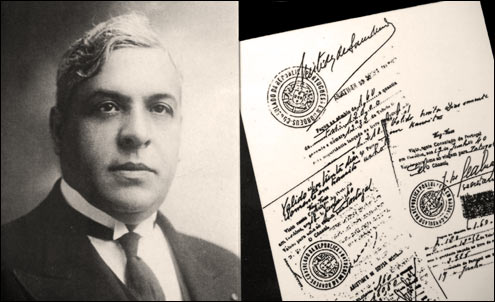
Sousa Mendes created an office, on the 17th, within the consulate. There, along with his sons, his wife, Rabbi Kruger and several Jewish refugees, he set up a production line. For three solid days and night, Mendes issued visas to every single refugee. To speed up the process, Mendes didn’t register the visas or take payment if there was none to be given. He signed using just his last name and stamped many visas directly onto pieces of paper. At one point, he saved the entire House of Hapsburg, the family of the Archduke of Austria, by way of granting 19 separate visas.
Over the course of the 17th, 18th and 19th of June, it is estimated that Mendes signed and issued in excess of 30,000 visas. It's worthy to note that many were not for singular individuals, countless visas were issued for entire families. Therefore it’s possible that Mendes saved the lives of an almost immeasurable number of people.
Roughly a third were for Jewish refugees the rest made up from fleeing Europeans, gypsies, displaced army personnel and a whole host of other frightened individuals and families. Mendes was single-minded in his efforts. He knew his time was running out and he was determined, now that he’d started, to save as many people as was humanly possible. Lisbon was enraged.
As all the visas bore Mendes' official stamp, it was considered an endorsement of Portugal. Whenever one of Mendes visas was presented at the French/Spanish border, it was classed as a request from Portugal to Spain. However, there was a consequence to the Spanish’ adherence to Portugal’s request - that being that none of the refugees were allowed to stop in Spain. They had to continue straight on to their country of destination – Portugal. On the 24th June, Mendes was directly recalled to Lisbon, via telegram. Mendes took his time over responding. He’d begun something that had reached a stage whereby it no longer mattered whether he stamped one more visa or another thousand.
Aristedes De Sousa Mendes In Bayonne
Aristides De Sousa Mendes Memorial
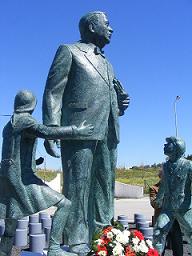
"It was indeed my objective to save all those persons, whose affliction was beyond describing. The imperatives of my conscience never ceased to guide me in the performance of my duties, with perfect knowledge of my responsibilities," Mendes, taken from a letter he wrote to his government. - Copyright American-Israeli Cooperative Enterprise, Reprinted with permission.
Mendes decided to travel south, to Bayonne. He knew that many more refugees were there, needing visas. On arrival in Bayonne, he discovered that the refugees had gathered at the Portuguese consulate. The orders from Lisbon had also been sent to Bayonne, and the staff were obeying them. However, Mendes had jurisdiction therefore he overruled the edict from Lisbon and once again began issuing visas in earnest. This continued for 48 hours. Unfortunately for Mendes, and the refugees, his fervent behaviour was wired to Lisbon. Mendes ceased and began making his way to Hendaye/Irun, the French/Spanish border. He continued to issue passes into Portugal, to those he met as he travelled. On several occasions, the Spanish border guards refused to allow refugees passage through Spain. It is known that on these occasions, Mendes himself raised the border gates, and more passed to freedom.
When Mendes could no longer raise the gates himself, he found an obscure section of the border, where the guards were unaware of the controversy surrounding him. Mendes did not return to Bordeaux until June 26th. That is when he first became aware that he’d been relieved of his duties by his government. Mendes turned south once again. Once he’d reached Hendaye, Mendes found many trapped. German platoons had started entering Bordeaux and Hendaye. Prudently, he continued to issue visas. Yet again, Lisbon was made aware of his on-going actions.
The Wrath Of Salazar
Refugees Of World War Two
- Aristides de Sousa Mendes Photographs
Many different photos of Aristde de Sousa Mendes, his family, his home and others - evidencing various parts of his life in print. The site is in Portuguese but the picture section is easy to navigate. - Luis Felip de Sousa Mendes
A site about Mendes by one of his sons – Luis Felipe – which details his memories regarding his father, family and event surrounding Bordeaux. Well worth reading.
Mendes finally left France on July 8th. Salazar wasn’t entirely sure how to handle Mendes. Mendes had directly disobeyed his order, and yet it was difficult to openly punish him. Portugal had swelled with refugees. Many thousands in the course of a few weeks. There was talk of Mendes courage and compassion everywhere. Indeed, Salazar himself was credited with the salvation of so many. In late July of that year, Life magazine ran a story that claimed Salazar as the greatest man of Portugal since Henry the Navigator. However, Mendes had committed an unforgivable act in Salazars eyes as he’d openly defied his leader.
Salazar refused to grant Mendes a meeting. In fact Mendes was never to be allowed to see Salazar again. After allowing for some small time to pass, and in order to formulate a strategy that would completely remove Mendes from office, Mendes was dismissed on the grounds that he was unable to meet the needs of his role due to his ‘professional incapabilities’. From that point on Mendes was shunned. Fully, completely, he became persona non grata to all.
Mendes was unable to gain employment. No one dared to interact with either him or his family. He had to withdraw his children from education. He prevented his loved ones from starving through an ironic twist of fate. The Mendes family was forced to eat at a soup kitchen, run by the Hebrew Immigration Society. This shunning continued, unabated. Mendes and Angelina were ignored in the streets. No one would employ his older children. By this stage the family had becomedestitute, and remained that way for a number of years. Mendes sent some of his children overseas, in the hope that they at least would be spared the further humiliation that was theirs simply because he was their father.
In the end, the strain of living in the gutters of society extracted a heavy toll upon Mendes. As the war finally drew to a close, in 1945, Mendes suffered a stroke, which left him partially paralysed. His beloved Angelina, and those of their children that still remained in Lisbon, cared for him, as best as they were able. Three years later, having given her all, having supported her husband in every choice he'd made, and with her love for him undiminished, Angelina suffered a brain haemorrhage. Six months after she fell unconscious, six months in which she was as the living dead, Angelina finally passed away. She was 60 years old.
On April 3rd 1954, six years after Angelina had passed away, Aristides de Sousa Mendes died, impoverished and rejected by his countrymen. No obituaries were to appear to mark his passing.
"I could not have acted otherwise, and I therefore accept all that has befallen me with love"
To this day, the man that should have become the pride of Portugal, the jewel in her crown, has become Portugal's biggest shame. Shunned in his time due to fear, still shunned almost 60 years later due to political maneuvering and an unwillingness to acknowledge his sacrifice.
It is my hope that one day his family will have all that they lost returned, and their pride in their name and family history both restored and celebrated.
Further Images Of The Aristides de Sousa Mendes Memorial
Click thumbnail to view full-size



I took the above photographs in June of this year. I wanted to see Aristides de Sousa Mendes memorial for myself. Despite the cloudy backdrop, it was a hot, humid and oppressive day. I set off by train, flowers cradled in my arms, hoping to see the memorial in a place of importance.
I was a little dismayed, on my arrival in Santarém, to discover that many people didn't know where the memorial statue was, or even what it represented. The roundabout is on the edge of Santarém and though at least Aristides is honoured, the site of his memorial was poignant and reminiscent of the man it was erected for.
Lonely, on the outskirts of town, little understood or known about.
I laid my flowers at his feet, took some time to think about the lives he saved, the sacrifices he made, and his acts of selfless heroism. I remembered him.

